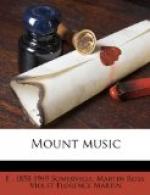On this particular afternoon the game had begun prosperously, with Christian as the Witch of Endor, and John as a blend of the Prophet Samuel and the Head Inquisitor of Spain. A smouldering saucer of sulphur, purloined by the witch herself from the kennels medicine-cupboard, gave a stimulating reality to the scene, even though it had driven the fox terriers, who habitually acted as the Witch’s cats, to abandon their parts, and to hurry, sneezing and coughing indignantly, to the kitchen. The twins, Jimmy and Georgy, however, obligingly took their parts, and all was going according to ritual, when one of the sudden and annoying attacks of rebellion to which she was subject, came upon the Witch of Endor. The orthodox conclusion involved a penitential march through the kitchen regions, the Witch swathed in a sheet, and carrying lighted candles, while she was ceremonially flagellated by the Prophet with one of his father’s hunting crops. This crowning moment was approaching, Christian had but to reply suitably to the intimidating riddles of the hymn, and the final act would open in all its solemnity. For, as has been said, the spirit of revolt whispered to her, and ingeniously persuaded her that the required recantation committed her to a falsehood.
As she told John, when the formal inquisition had passed through acrid dispute to torture, she didn’t tell lies.
CHAPTER II
In the days when Christian Talbot-Lowry was a little girl, that is to say between the eighties and nineties of the nineteenth century, the class known as Landed Gentry was still pre-eminent in Ireland. Tenants and tradesmen bowed down before them, with love sometimes, sometimes with hatred, never with indifference. The newspapers of their districts recorded their enterprises in marriage, in birth, in death, copiously, and with a servile rapture of detail that, though it is not yet entirely withheld from their survivors, is now bestowed with equal unction on those who, in many instances, have taken their places, geographically, if not their place, socially, in Irish every-day existence. There is little doubt but that after the monsters of the Primal Periods had been practically extinguished, a stray reptile, here and there, escaped the general doom, and, as Mr. Yeats says of his lug-worm, may have-sung with “its grey and muddy mouth” of how “somewhere to North or West or South, there dwelt a gay, exulting, gentle race” of Plesiosauridae, or Pterodactyli. Even thus may this record be regarded; as partial, perhaps, but as founded on the facts of a not wholly to be condemned past.




